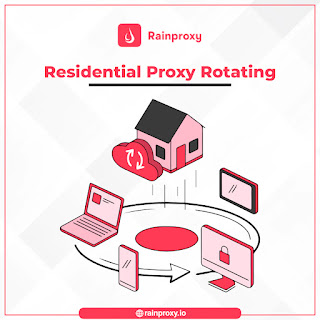The Rotating Residential Proxies Guide
You frequently receive new IP addresses via rotating proxies. The rotation period's length changes depending on the number of requests and available time. For instance, you can send 300 distinct IP address connection requests.
Any proxy type could rotate, in theory. The settings are the problem. The majority of home proxy servers regularly change their IP addresses. Residential proxies can't be static because they rely on real people with erratic connections. Your best chance of success is a persistent IP address, which stays the same for 10 to 30 minutes.
The best sneaker bot proxies offer unlimited bandwidth, are anonymous, and promise 99% uptime. They also support HTTPS and SOCKS5.
Rotating residential proxies has advantages.
You can get around blocks for sending too many requests and circumvent geo-restrictions using proxy servers. If your IP address sends many requests quickly, it can be flagged as suspicious and blocked.
However, after a set amount of time or after each session, rotating proxies change your IP address, making it impossible for websites to track your activity. Therefore, a new device or user is making each set of queries.
Rotating proxies are helpful in several circumstances. They can accommodate most proxy requirements, much like their non-rotating cousins. Users can submit a lot of requests quickly thanks to their rotating nature, even more than the cap of 600 per hour.
IP Rotation
A rotating proxy server will frequently alter your IP address.
Setup.
Your queries can be redirected to different locations using rotating proxies to pass via a load-balancing server.
Anonymity.
More anonymity is provided by rotating residential proxies. Website owners may have trouble tracking your identity or online activities because your IP address changes after every session or after a specific amount of time.
Price.
How much bandwidth you utilize or how many IP addresses you access simultaneously determines how much a rotating proxy service costs.
Options.
You can change the gateway server settings if you employ a rotating proxy to change the IP address's location or the frequency of its cycles. The number of IP addresses you receive is also up to you.
Solving problems
Your IP address should be functional. If so, try another IP address from the pool.
Conclusion
Rotating residential proxies allows you to access the internet from a single port anonymously while hiding behind a pool of often changing IP addresses. As opposed to static residential proxies, these proxies switch between IPs in the collection regularly or after each session. You can make as many requests without anyone knowing because your online identity is constantly changing.
Residential proxies that rotate offer exceptional performance, anonymity, security, and durability. It is nearly impossible for websites to track your actions and stop traffic because your IP addresses frequently change. Choose Rainproxy for Residential proxy rotating. You can scrape any form of data with exceptionally high success rates using Rainproxy.

%20(1).jpg)


Comments
Post a Comment